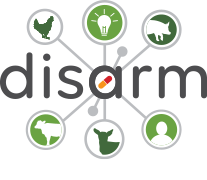Effective water vaccination: the importance of water quality
Good vaccination schemes are an important part of good farm management. Vaccination prevents diseases (and secondary bacterial infections) and thus antibiotic use. Many live vaccines can be administered via the drinking water, whereas some need to be injected. Drinking water vaccination is very practical, but the efficacy is highly influenced by the water quality/composition. These important points concerning the drinking water should be kept in mind at all times:
Use water of high quality! Unwanted components can interfere with the vaccine. Unpalatable water can be detrimental because of lower water uptake. Check the DISARM Best Practice Guide for water quality for more information on how to evaluate and remediate water quality.
At least 48h before vaccination: cease all water treatments. In case of live bacterial vaccines (e.g., Salmonella, Mycoplasma): stop antibiotic treatments at least 7 days before AND after vaccination.
Flush the pipes thoroughly to remove all residues of cleaning and disinfection products. This is essential to avoid inactivation of the vaccine.
Add a water stabilizer that binds substances such as chlorine in tap water to avoid vaccine inactivation.
Check the DISARM best practice guide for vaccination protocols for more information on effective vaccination practices.
Source: N. Sleeckx, Drinkwatermedicatie, Proefbedrijf pluimveehouderij vzw, 2014.
